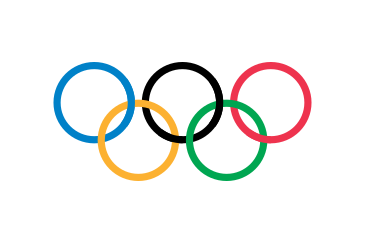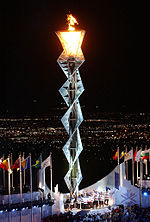Portal:Olympic Games
The Olympic Games Portal

The modern Olympic Games (Olympics; French: Jeux olympiques) are the world's leading international sporting events. They feature summer and winter sports competitions in which thousands of athletes from around the world participate in a variety of competitions. The Olympic Games are considered the world's foremost sports competition, with more than 200 teams, representing sovereign states and territories, participating. By default, the Games generally substitute for any world championships during the year in which they take place (however, each class usually maintains its own records). The Olympics are staged every four years. Since 1994, they have alternated between the Summer and Winter Olympics every two years during the four-year Olympiad.
Their creation was inspired by the ancient Olympic Games, held in Olympia, Greece, from the 8th century BC to the 4th century AD. Baron Pierre de Coubertin founded the International Olympic Committee (IOC) in 1894, leading to the first modern Games in Athens in 1896. The IOC is the governing body of the Olympic Movement, which encompasses all entities and individuals involved in the Olympic Games. The Olympic Charter defines their structure and authority.
The evolution of the Olympic Movement during the 20th and 21st centuries has resulted in numerous changes to the Olympic Games. Some of these adjustments include the creation of the Winter Olympic Games for snow and ice sports, the Paralympic Games for athletes with disabilities, the Youth Olympic Games for athletes aged 14 to 18, the five Continental Games (Pan American, African, Asian, European, and Pacific), and the World Games for sports that are not contested in the Olympic Games. The IOC also endorses the Deaflympics and the Special Olympics. The IOC need to adapt to a variety of economic, political, and technological advancements. The abuse of amateur rules prompted the IOC to shift away from pure amateurism, as envisioned by Coubertin, to the acceptance of professional athletes participating at the Games. The growing importance of mass media has created the issue of corporate sponsorship and general commercialisation of the Games. World Wars I and II led to the cancellation of the 1916, 1940, and 1944 Olympics; large-scale boycotts during the Cold War limited participation in the 1980 and 1984 Olympics; and the 2020 Olympics were postponed until 2021 because of the COVID-19 restrictions.
Selected Article -
The original five Winter Olympic Sports (consisting of nine disciplines) were bobsleigh, curling, ice hockey, Nordic skiing (consisting of the disciplines military patrol, cross-country skiing, Nordic combined, and ski jumping), and skating (consisting of the disciplines figure skating and speed skating). The Games were held every four years from 1924 to 1936, interrupted in 1940 and 1944 by World War II, and resumed in 1948. Until 1992, the Summer Olympic Games and the Winter Olympic Games were held in the same year. A decision to change this was made in 1986, when during the 91st International Olympic Committee session, IOC members decided to alternate the Summer Olympic Games and the Winter Olympic Games on separate four-year cycles in even-numbered years. Also, at that same congress it was decided that 1992 Winter Olympics would be the last to be held in the same year as the Summer Games and that to change the rotation, the games that would be held in 1996 would be brought forward by two years, being scheduled to 1994. After those games, the next were to be held in 1998 when the four-year Olympic Cycle resumed.
The Winter Olympic Games have evolved since their inception. Sports and disciplines have been added and some of them, such as alpine skiing, luge, short track speed skating, freestyle skiing, skeleton, and snowboarding, have earned a permanent spot on the Olympic program. Some others, including curling and bobsleigh, have been discontinued and later reintroduced; others have been permanently discontinued, such as military patrol, though the modern Winter Olympic sport of biathlon is descended from it. Still others, such as speed skiing, bandy and skijoring, were demonstration sports but never incorporated as Olympic sports. The rise of television as a global medium for communication enhanced the profile of the Games. It generated income via the sale of broadcast rights and advertising, which has become lucrative for the IOC. This allowed outside interests, such as television companies and corporate sponsors, to exert influence. The IOC has had to address numerous criticisms over the decades like internal scandals, the use of performance-enhancing drugs by Winter Olympians, as well as a political boycott of the Winter Olympic Games. Countries have used the Winter Olympic Games as well as the Summer Olympic Games to proclaim the superiority of their political systems.
Selected Picture -
 |
The five Olympic rings represent the five continents and were designed in 1913, adopted in 1914 and debuted at the Games at Antwerp, 1920.
Selected Quote -
| “ | The road to the Olympics, leads to no city, no country. It goes far beyond New York or Moscow, ancient Greece or Nazi Germany. The road to the Olympics leads — in the end — to the best within us. | ” |
| — Jesse Owens, African-American athlete, winner of 4 Gold medals in the 1936 Summer Olympics. | ||
Selected Athlete -
Current Events
Did You Know...-

- ... that Canadian coxswain Lesley Thompson has competed at six different Olympics, and won medals in four of them?
- ... that Anna Kozlova has competed in three Olympics, once for the Unified Team (former Soviet Union) and twice for the United States?
- ... that Zhuang Xiaoyan won China's first Olympic gold medal in judo in 1992 games?
- ... that Samuel Wanjiru, the 2008 Olympic marathon champion, won the Fukuoka Cross Country competition when he was only 16 years old?
- ... that Lauren Burns won Australia's first Olympic gold medal in taekwondo?
Upcoming Olympic Games
2024 Summer Olympics

The 2024 Summer Olympics (French: Les Jeux Olympiques d'été de 2024), officially the Games of the XXXIII Olympiad (French: Jeux de la XXXIIIe olympiade de l'ère moderne) and branded as Paris 2024, were an international multi-sport event held from 26 July to 11 August 2024 in France, with several events started from 24 July. Paris was the host city, with events (mainly football) held in 16 additional cities spread across metropolitan France, including the sailing centre in the second-largest city of France, Marseille, on the Mediterranean Sea, as well as one subsite for surfing in Tahiti, French Polynesia.
Paris was awarded the Games at the 131st IOC Session in Lima, Peru, on 13 September 2017. After multiple withdrawals that left only Paris and Los Angeles in contention, the International Olympic Committee (IOC) approved a process to concurrently award the 2024 and 2028 Summer Olympics to the two remaining candidate cities; both bids were praised for their high technical plans and innovative ways to use a record-breaking number of existing and temporary facilities. Having previously hosted in 1900 and 1924, Paris became the second city ever to host the Summer Olympics three times (after London, which hosted the games in 1908, 1948, and 2012). Paris 2024 marked the centenary of Paris 1924 and Chamonix 1924 (the first Winter Olympics), as well as the sixth Olympic Games hosted by France (three Summer Olympics and three Winter Olympics) and the first with this distinction since the 1992 Winter Games in Albertville. The Summer Games returned to the traditional four-year Olympiad cycle, after the 2020 edition was postponed to 2021 due to the COVID-19 pandemic.
Paris 2024 featured the debut of breaking as an Olympic sport, and was the final Olympic Games held during the IOC presidency of Thomas Bach. The 2024 Games were expected to cost €9 billion. The opening ceremony was held outside of a stadium for the first time in modern Olympic history, as athletes were paraded by boat along the Seine. Paris 2024 was the first Olympics in history to reach full gender parity on the field of play, with equal numbers of male and female athletes.
All-time Combined Olympic Games Medal Table
Separate current and precursor NOCs (records not combined):
| No. | Nation | Gold | Silver | Bronze | Total |
|---|---|---|---|---|---|
| 1 | 1,219 | 1,000 | 876 | 3,095 | |
| 2 | 473 | 376 | 355 | 1,204 | |
| 3 | 325 | 258 | 221 | 804 | |
| 4 | 322 | 318 | 320 | 960 | |
| 5 | 310 | 344 | 360 | 1,014 | |
| 6 | 281 | 320 | 360 | 961 | |
| 7 | 271 | 244 | 284 | 799 | |
| 8 | 216 | 232 | 242 | 690 | |
| 9 | 213 | 187 | 176 | 576 | |
| 10 | 206 | 191 | 221 | 618 |
2026 Winter Olympics

The 2026 Winter Olympics (Italian: Olimpiadi invernali del 2026), officially the XXV Olympic Winter Games (Italian: XXV Giochi olimpici invernali) and also known as Milano-Cortina 2026, is an upcoming international multi-sport event scheduled to take place from 6 to 22 February 2026 in three regions, with the Italian cities of Milan and Cortina d'Ampezzo as main hosts.
This will be the fourth Olympic Games hosted in Italy, which previously hosted the 1956 Winter Olympics in Cortina d'Ampezzo, the 1960 Summer Olympics in Rome, and the 2006 Winter Olympics in Turin. It will be the first Olympic Games officially featuring multiple host cities and will be the first Winter Olympics since Sarajevo 1984 where the opening and closing ceremonies will be held in different venues. These games will become the first of two consecutive Winter Olympic Games to be hosted (at least partially) in the European Alps, followed by the French Alps in 2030. The Organizing Committee received the Olympic flag during the closing ceremony of the 2022 Winter Olympics in Beijing, China. Along the main host cities, events will also take place in seven other north-northeastern Italian cities. The games will mark the 20th anniversary of the Winter Olympics in Turin, also the 70th anniversary of the Winter Olympics in Cortina d'Ampezzo. This also marks the first time that Milan will host the Olympic Games. These games will mark the first Winter Olympics under a new IOC President, who is expected to be elected in 2025 at the 143rd IOC Session. The joint bid from the two cities beat also another joint bid from Swedish cities Stockholm–Åre by 47–34 votes at the 134th Session of the International Olympic Committee (IOC) in Lausanne, Switzerland, on 24 June 2019.
Olympic Sports
- Archery
- Artistic swimming
- Athletics
- Badminton
- Baseball
- Basketball
- Beach volleyball
- Boxing
- Canoeing
- Cricket
- Cycling
- Diving
- Equestrian
- Fencing
- Football
- Golf
- Gymnastics
- Handball
- Field hockey
- Judo
- Lacrosse
- Modern pentathlon
- Rowing
- Rugby
- Sailing
- Shooting
- Skateboarding
- Softball
- Sport climbing
- Squash
- Surfing
- Swimming
- Table tennis
- Taekwondo
- Tennis
- Triathlon
- Volleyball
- Water polo
- Weightlifting
- Wrestling
Olympic Games Countdown
| Olympic Games | |||||||||||||||||||||||
|---|---|---|---|---|---|---|---|---|---|---|---|---|---|---|---|---|---|---|---|---|---|---|---|
|
|
|
| ||||||||||||||||||||
| Paralympic Games | |||||||||||||||||||||||
|---|---|---|---|---|---|---|---|---|---|---|---|---|---|---|---|---|---|---|---|---|---|---|---|
|
|
|
| ||||||||||||||||||||
| Youth Olympic Games | |||||||||||
|---|---|---|---|---|---|---|---|---|---|---|---|
|
| ||||||||||
Topics
Categories
Try browsing through any of the main categories below:

Things you can do
 |
Here are some tasks awaiting attention:
|
Related portals
Associated Wikimedia
The following Wikimedia Foundation sister projects provide more on this subject:
-
Commons
Free media repository -
Wikibooks
Free textbooks and manuals -
Wikidata
Free knowledge base -
Wikinews
Free-content news -
Wikiquote
Collection of quotations -
Wikisource
Free-content library -
Wikispecies
Directory of species -
Wikiversity
Free learning tools -
Wikivoyage
Free travel guide -
Wiktionary
Dictionary and thesaurus



































